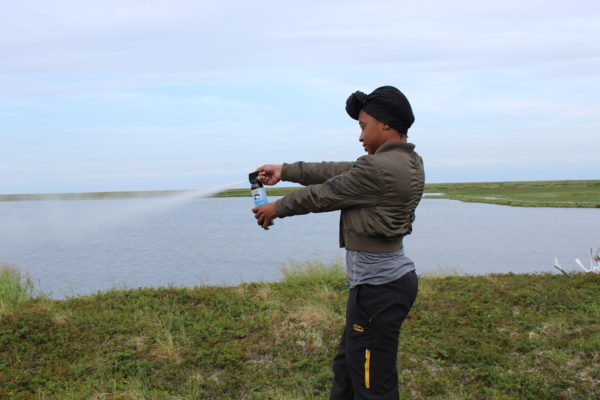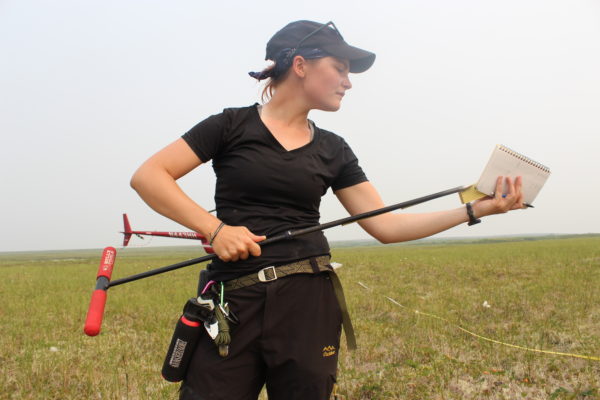“Let’s gather, everyone, on the front of the barge for a safety talk,” Max called.
The morning was cool, still, and buggy after a cold, windy night, the Kolyma glassy with a slight green tint accentuated by the sun. Ready to go, we stood around in our multi-layered gear, boots, and bug shirts with face masks zipped, while the scientists finished packing their bottles and vials and flasks and measuring devices with acronymic names.
“Is everyone here? Okay, listen to Nikita tell us about all the ways to get hurt at Duvannyi Yar.”

John shows off his boot after sinking calf-deep into the treacherous mud of Duvannyi Yar. © Becky Tachihara
“Yes, this is dangerous place,” said Nikita gesturing to the green, black, and ice-wedged cliffs away to port. “You must take it seriously. Things fall all the time. You don’t want to be under them. Plus you can get stuck in mud. If that happens—“ He demonstrated what to do then by dropping to hands and knees and crawling away. “Like crocodile. Never mind boots, leave boots. Better to lose your boots than your life.” (As if to illustrate the point, a moose stuck in the mud was decomposing on the riverbank likely after dying a slow miserable death by starvation.) “Also, if it looks soft and muddy, it probably is. Don’t walk there. Walk on vegetation or fallen trees. What else?”
“Don’t go wandering off by yourself,” Max warned. “Stay with your group.” There are a lot of ways to get hurt at Duvannyi Yar.
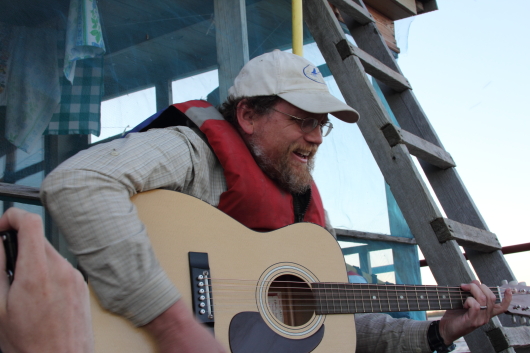
John plays guitar for a sing-along on the deck of the barge on our first night of travel to Duvannyi Yar. Musical moments are a regular feature of life on the barge; some singing and guitar playing is a great way to unwind at the end of a long day working in the field or labs. © Becky Tachihara
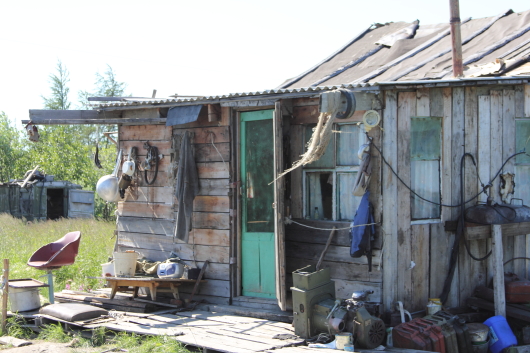
The first visible building at Laeonid’s camp faces out toward the river, adorned with fishing gear, fuel tanks and what looks like an old motor. © Becky Tachihara
Thirty-six hours earlier, a grizzled, hard-working towboat used to transport fish and supplies for outlying fish camps, came alongside the barge; Sergei and Nikita Zimov and the captain rigged for a side-tow, and we got underway by 2300 in bright sun (that never sets this time of year). It was cold for the first time since we’d arrived on station, and a stiff, steely wind blew the bugs away as we turned off the Panteleikha River to merge the big Kolyma. So began a happy, loud, and festive night. Nastya, Nikita’s wife, and Sergei Davidoff, a Russian scientist and co-founder of the Northeast Station, joined us. along with Sergey Zimov’s old friend Laeonid Nalyotov, a fisherman and musician who lives at his camp on the Parshino River, a day’s steam up the Kolyma from the station. We were mesmerized by his haunting, exotic song about Stalin-era life and death. While he sang, I was touched not only by the power of the sound like none I had ever heard, but also by the fact of this exquisite, fleeting Polaris Project experience, that here we were, a broad mix of nationalities and life experience floating on a barge up a big Siberian river to a place where Pleistocene bones protrude from permafrost. What a creative conception it was by its originator, whom people have taken to calling “Papa Max.” We stayed up way too late.
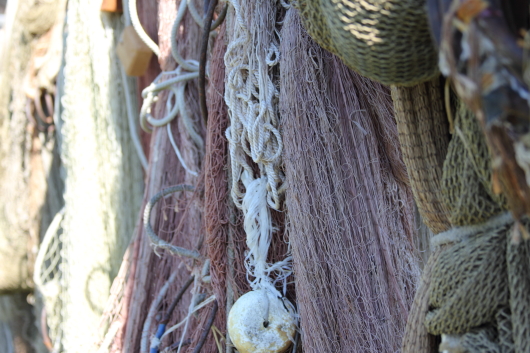
Fishnets awaiting use hang on a frame standing in the tall grass off to one side of Laeonid’s camp. © Becky Tachihara
Next morning, still eight hours from our destination, we angled off of the Kolyma into the narrower Parshino River. The towboat driver, with help from Laeonid and Sergey Zimov’s local knowledge, picked his way through the shallows. Sibilant wind filtered through the larches, and in their lee, the temperature rose to one-layer level. Suddenly on the starboard side, a little patch of “civilization” appeared. Laeonid’s fish camp. The observers, absorbers ashore to witness a fragment of Siberian subsistence, while the stream team ventured off into the woods and the aquatic scientists headed out onto a nearby, white-capped lake in a little skiff to take still more soil and water soil samples. Before we left the barge, as the Russians were handling shorelines, Nikita translated Laeonid’s admonition, “Don’t approach the dogs.” Remarkable animals, they were huge, Newfie sized but with thick multi-layer coats bred for the other seasonal extreme, not this one. By translation, Laeonid told me that in good snow the four dogs can pull a sled with him and three hundred kilos of gear aboard. He invited me into his house, rustic and weather beaten on the outside, basic but cozy inside, linoleum floors, a bear and wolverine skin akimbo on the papered wall. I wished we could communicate in terms more informational than pantomime. I would liked to have heard something about his past and the distinctive choice he must have made many years ago, about the realities of life out here, particularly in winter, and about how in summer he survives these swarms of mosquitoes without going flat nuts. (Laurel, part of the stream team who went somewhere hellish with John, told me she killed thirty with one slap to her hat, a record to date.) His helper, a silent man who looked like he was assembled from cable wire seemed not to notice us or the swarm of bloodsuckers orbiting his bare head. How does one reach that point?
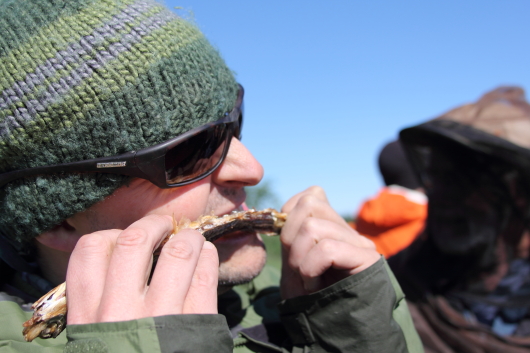
Paul tries to tear off a piece of Laeonid’s dried fish. Laeonid let us take a few fish with us for everyone to try; it tasted a little like beef jerky, but fishier. © Becky Tachihara
Laeonid gill nets whitefish, char, and sturgeon in summer, and in winter he drops bait through augured ice holes. Old nets were draped over rollers and larch poles, and several battered aluminum skiffs with ancient outboards were hauled up bow first on the riverbank. A hard life for men, dogs, and boats. Out in the weeds there was what I took to be a defunct armored personnel carrier and near the back porch the corpses of snowmobiles. Desiccated whitefish were strung on a wire over the porch. Take, Laeonid gestured, take. We did. We tore off strips with nails and teeth and passed them around. Good, everyone agreed. It’s go really well, someone conjectured, with a beer.
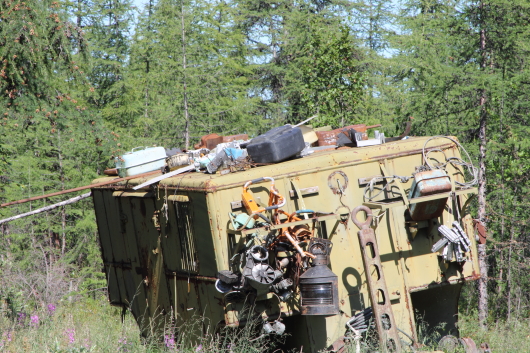
An abandoned truck littered with containers and other assorted pieces of metal and wire sits in the grass toward the back of Laeonid’s camp. © Becky Tachihara
A sucker for dogs, I resisted the stupid temptation to approach and examine those coats. This would be a bad place to get hurt, especially stupid after explicit instructions to stay away from them. Anyway, it was time to go; Duvannyi Yar was still a long way off against the current. I shook Laeonid’s leathery hand and thanked him for his hospitality. I waved at his helper, who pretended not to see me.
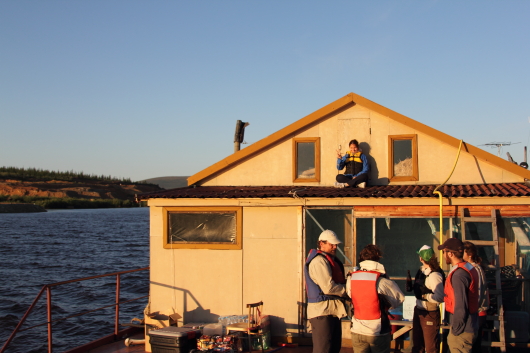
A crowd gathers on the front of the barge as we set off for Duvannyi Yar. Anya escaped to the roof for a better view. © Becky Tachihara
“Are there any questions?” Max asked the assembled team on the bow. “No?… We’ve got a beautiful day for it. Okay, let’s go.”


